英语 介词的分类详解读
- 格式:docx
- 大小:15.77 KB
- 文档页数:9
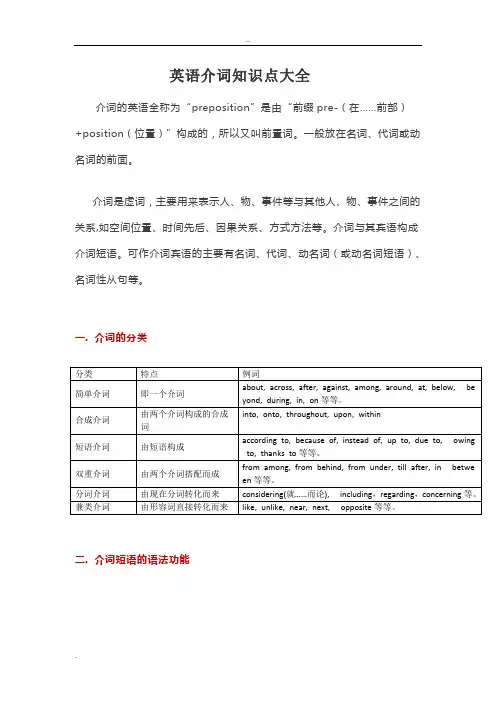
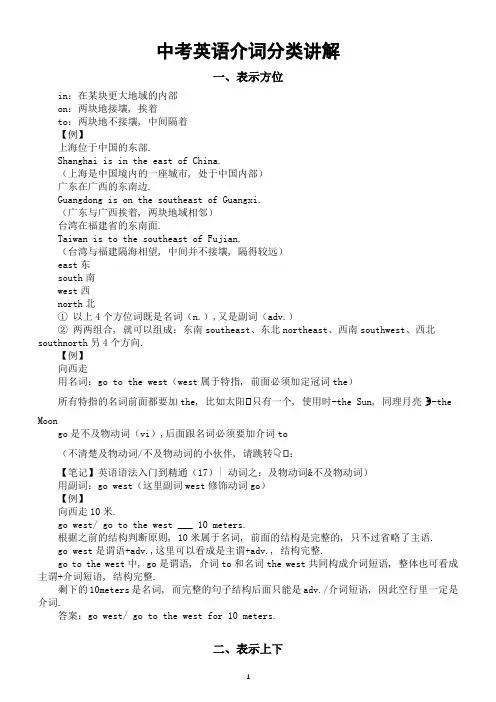
中考英语介词分类讲解一、表示方位in:在某块更大地域的内部on:两块地接壤, 挨着to:两块地不接壤, 中间隔着【例】上海位于中国的东部.Shanghai is in the east of China.(上海是中国境内的一座城市, 处于中国内部)广东在广西的东南边.Guangdong is on the southeast of Guangxi.(广东与广西挨着, 两块地域相邻)台湾在福建省的东南面.Taiwan is to the southeast of Fujian.(台湾与福建隔海相望, 中间并不接壤, 隔得较远)east东south南west西north北①以上4个方位词既是名词(n.),又是副词(adv.)②两两组合, 就可以组成:东南southeast、东北northeast、西南southwest、西北southnorth另4个方向.【例】向西走用名词:go to the west(west属于特指, 前面必须加定冠词the)所有特指的名词前面都要加the, 比如太阳☀️只有一个, 使用时-the Sun, 同理月亮 -theMoongo是不及物动词(vi),后面跟名词必须要加介词to(不清楚及物动词/不及物动词的小伙伴, 请跳转 :【笔记】英语语法入门到精通(17)| 动词之:及物动词&不及物动词)用副词:go west(这里副词west修饰动词go)【例】向西走10米.go west/ go to the west ___ 10 meters.根据之前的结构判断原则, 10米属于名词, 前面的结构是完整的, 只不过省略了主语.go west是谓语+adv.,这里可以看成是主谓+adv., 结构完整.go to the west中, go是谓语, 介词to和名词the west共同构成介词短语, 整体也可看成主谓+介词短语, 结构完整.剩下的10meters是名词, 而完整的句子结构后面只能是adv./介词短语, 因此空行里一定是介词.答案:go west/ go to the west for 10 meters.二、表示上下↑在....上:over、above、on↓在....下:beneath、under、below①正上-正下:over-underover还有覆盖在某物体上面的意思, 也属于接触面, 但注意和on的区别, on只表示在物体表面, 没有覆盖的意思.②非正上-非正下:above-below不强调正上方/正下方时, 只要是上/下方都可以用.③表面上-表面下:on-beneath【例】你头顶正上方有一幅画.There is a painting over your head.树下面有一只大象 .There is an elephant under the tree.树上有很多苹果.There are many apples on the tree.(苹果是长在树上 的, 属于接触表面)地下有很多文物.There are a lot of antiques beneath the ground.(也可以用underground一个词表示“地下”)飞机 在云层上飞行.The plane flew above the clouds.气球在房子 上方10米处.A balloon is 10 meters above the house.(可以加具体数量词精确描述)请把你的名字写在下面.Please write your name below.三、表示前后前:in (the)front of/before后:in/at(the)back of/behind【例】那辆车在我的后面.The car is in back of me.The car is at back of me.The car is behind me.(更常用这句)我们在这座雕像前拍照吧.Let's take a photo in front of/before the statue.他坐在教室里的前面.He sits in the front of the classroom.他坐在车里的后面.He sits in the back of the car.He sits at the back of the car.四、表示附近/周围周围:around附近:near旁边:by/beside/next to【例】我手边有一支笔.There is a pen next to/beside my hand.电话在窗户旁边.The telephone is by the window.书在柜子边.The book is beside the cabinet.小狗绕着我跑.The dog ran around me.老师住在我家附近.My teacher lives near my home.五、表示中间两者之间:between在许多东西中间(3个及以上):among在许多东西的正中间(3个及以上):in the middle of【例】他坐在我和Tom的中间.He sits between me and Tom.他们在人群中行走.They walked among the crowds.他在那群人中很优秀.He is outstanding among those people.他正站在人群的正中央.He is standing in the middle of the crowd.六、表示穿越/穿过横穿:across(随随便便地穿过去)从物体内部穿过:through(水从水管流过)从物体上方穿过:over(跨栏杆)从物体旁边穿过:pass/by【例】这条小路穿过一片树林.The path goes through a wood.(小路是从树林里穿过)透过这扇窗, 你能看到一座教堂.Through the window, you can see a church.(through还可以表示目光穿过)我能隔墙听到他们交谈.I can hear their talk through the wall.(through还可以表示透过...听到声音)你穿过这道大门, 就看到左面的房子了.Go through this gate, and you'll see the house on your left.(人走过大门, 也是内部穿过)( 注意:这句话由2个简单句组成,中间逗号隔开, 并用and连接)他独自一人穿越了沙漠.He went across the desert alone.(alone这里做副词)飞机飞过了一座城市.The plane flew(fly过去式) over a city.他跳过了篱笆.He jumped over the fence.我经过了你的家.I passed your home.七、instead / instead of表示代替/而是instead-副词(adv.)instead of-介词【例】他没买手机, 而是买了电脑.① He didn't buy a phone instead of buying a laptop.(1句话)instead of是介词, 后面原本要加名词, 但buy是动词, 放在介词后面要变成ing形式(即动词+ing做为名词成分, 属于非谓语动词的一种, 后面会细讲, 记得关注哦~)句子结构分析:He didn't buy a phone.是一套完整的主谓宾,后面可以直接加介词短语/副词, instead of 是介词, 后面要加名词, 把动词buy变ing形式, 变成名词.② He didn't buy a phone.He bought a laptop instead.(2个简单句)同理, 前后2句都是完整的主谓宾,instead是副词, 原句意是买电脑替代了原本要买的手机, 所以instead放在第2句里.洗淋浴吧, 别用浴缸了.Take a shower instead of a bath.Don't use the bath.Take a shower instead.八、according to / based onaccording to根据based on以...为基础2个都是介词短语, 在句子里前后都能放.【例】据迈克说, 这是一部很棒的电影.According to Mike, it's a great movie.(放句首要用逗号隔开)根据我的经验, 明天会下雪.It will snow tomorrow according to my experience.(不放句首时不用逗号隔开)本书是根据个人经历写成的.The book is based on personal experience.九、besides / except /except for /apart from表示除了...注意区别:besides如果去掉s,就是beside在...旁边besides-表示除了, 还...., 包括“除了”的那部分, 比如:除了喜欢吃香蕉 , 还喜欢吃苹果.两者仍然都属于“喜欢吃”的范围内.except-仅表示除了...之外, 排除意味更明显.except for-用法同except, 但更强调美中不足的那部分.apart from-besides和except的用法都可以用.【例】除了周末我们每天都工作.We work every day except/apart from weekend.(把周末排除在外)除足球外你还喜欢哪些运动?What other sports do you like besides football?(除了喜欢...还喜欢....)除了英语, 我还喜欢数学.I like math besides/apart from English.你英语很好, 除了一些语法错误.Your English is good except for some grammar mistakes.(美中不足)十、ahead of表示在...前面①不同于03部分的方位介词, ahead of的“前面”更宽泛:方位/时间(提前)/能力(优秀)/名次(领先)...② ahead of前面可以加数量词修饰.【例】有两只猫在我们前面.Two cats are ahead of us.(表示方位,可与 03部分的方位词替换)我在最后期限之前完成了作业.I finished homework ahead of the deadline.我们提前15分钟完成了测验.We finished test 15 minutes(数量/时间) ahead of time.她前程远大.She has a great future ahead of her.(a great表示数量多,程度深)她总是遥遥领先班上的同学.She was always(adv.做状语) ahead of her classmates.十一、as for 表示至于...【例】至于作业, 我明天会完成.As for my homework, I will finish it tomorrow.至于这封信, 我交给他了.As for this letter, I gave it to him.至于其他人, 回家吧.As for the others, go home.十二、of/about/on表示关于...of-比较浅显地提及, 聊到, 顺带提一嘴的感觉about-比of稍深入一点, 日常使用on-比较正式介绍时使用, 偏专业【例】昨天晚上他没有提起他妈妈.He didn't talk about his mother last night.他们谈到即将到来的圣诞节.They talk of the coming Christmas.我没有想(考虑)到成本.I don't think of the cost.我得思考一下这件事.I have to think about this thing.这是一本关于历史的书.This is a book on history.十三、like 表示像...like有2种词性:①表示喜欢时, like是动词【例】我喜欢香蕉和苹果.I(主) like(谓) banana and apple(宾).②表示像...时, like是介词,后面+n./doing(动词的名词形式)/从句.【例】我不喜欢像Tom这样的人.I don't like people like Tom.(第一个like是动词, 第二个是介词)她好像我妈妈.She is like my mother.如果“好像”前面没有主语, 用It's like(that)...., that可加可不加.It's not like...(不像.../跟...不一样)【例】好像她说的是真的.It's like (that) what she said is true.好像是他拿走了我的书.It's like (that) he took my book.你并不爱她.It's not like you love her.和上次不一样.It's not like last time.跟我3年前看到的不一样.It's not like what I saw 3 years ago.十四、as 表示当作...as这里作为介词,表示当作..., 中文意思里和like表示像...相近, 但as的所谓“像”的程度比like更深, 甚至可以理解为"就是...(通常是职业或身份)", 而like仅仅是“相像”.【例】她把我当做朋友一样.She treats me as a friend.(像对待朋友一样对待“我”)你可以把那个玻璃杯当作花瓶用.You can use that glass as a vase.他工作起来像个警察.He works as a police.(几乎就是警察)He works like a police.(只是像, 但并不等于就是警察)十五、in exchange/return/reward for...表示作为....的交换/回报/奖励① in exchange for-作为...的交换【例】我用我的照相机交换他的DVD.I gave him my camera in exchange for his DVD.② in return for-作为...的报答【例】为了报答他的帮助,我给他送了份礼物.I gave him a present in return for his help.③ in reward for-作为...的奖励【例】他因勇敢获得了钱.He received money in reward for his bravery.【英语语法笔记(30)】介词(三):表示“原因”的介词大汇总十六、表示原因-Because of(because是连词, 加上of变成了介词)-Due to通常放在句首, 引导一个简单句子或复合句中的从句.它们的语气比较中性, 不会带有太多情感色彩.【例】因为下雨, 他迟到了.Because of the rain, he was late.由于天气炎热, 他决定待在家里.Due to the hot weather, he decided to stay home.-As a result of 作为...的结果表示结果或影响, 通常放在句子的开头或结尾, 引导一个简单句子或复合句中的从句.它的语气比较正式, 有时带有一定的客观性.【例】她因受伤而死亡.She died as a result of her injuries.由于雾太大, 所有航班都延误了.As a result of the heavy fog, all flights have been delayed.-On account of-Owing to表示"由于", 语气比较正式、书面化, 常见于正式文体中.【例】由于天气不好,飞机延迟了.The flight was late on account of the bad weather.The flight was late owing to the bad weather.注意:以上 这些表示原因的词组都属于介词, 后面要加名词/代词/动名词(后2个都相当于名词)十七、thanks to...多亏了...thanks to也有表示原因的意味.【例】多亏了你的帮助, 我才能按时完成项目.Thanks to your help, I was able to finish the project on time.多亏了你, 我们才能出国.Thanks to you, we can go abroad.多亏了你, 现在大家都知道了!Everyone knows about it now, thanks to you!(这句话更贴近咱中文“正话反说”, 或有点儿讽刺意味的那种感觉)十八、for/at/from/of/with/by/out of/through表示原因-for:表示某事发生的原因, 常用于解释某种行为或结果.【例】我对我的错误感到很抱歉.I'm sorry for my mistake.他为迟到道歉.He apologized for being late.-at:表示某个事件A/状态是导致某事B发生的原因.【例】他粗鲁的行为让她生气.She was angry at his rude behavior.Tom的妈妈对Tom的成绩感到很惊讶.Tom's mother was surprised at Tom‘s grades.-from:强调事件发生是源于外部原因-of:强调事件发生是源于内部原因【例】他死于车祸.He died from a car accident.他死于饥饿.He died of starvation.(这里原句可以理解为:他死了, 是因为某个原因, 前半句是个完整句子, 后面加上介词短语表示“原因”)-with:因情绪导致某事或某种状态发生.【例】他激动地大叫.He yelled with excitement.他气得发抖.He shivered with anger.(anger是angry(a.)的名词)-by:通常用by mistake(搞错了)/by chance(偶然)/by accident(意外)【例】他错误地删除了文件.His deleted the file by mistake.警方误抓了他.He has been arrested by mistake.我碰巧在机场遇见她.I met her by chance at the airport.我看见这封信纯属偶然.I saw the letter purely by chance.她碰巧发现了这个问题.She discovered the problem by accident.这不是偶然.It doesn't happen by accident.-out of:表示出于...原因【例】她接受这份工作是出于必要.She took the job out of necessity.他只是出于兴趣做的这份工作.He did this job just out of interest.-through:表示通过...获得结果【例】公司通过创新和辛勤工作取得了成功.The company achieved success through innovation and hard work. 病人通过物理治疗恢复了健康.The patient recovered through a physical therapy.。
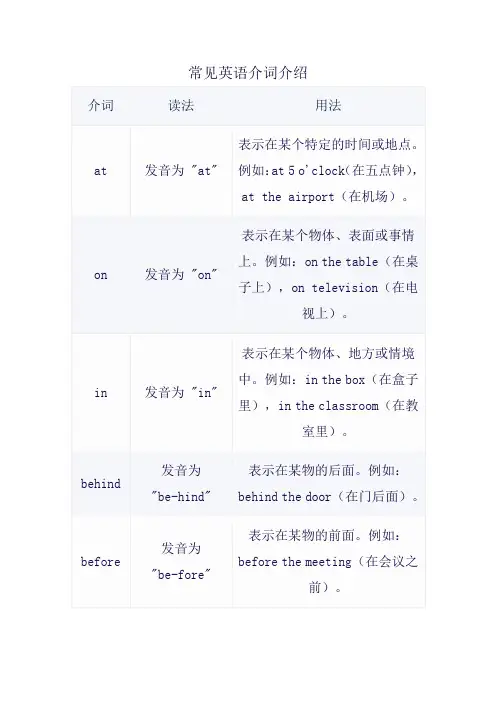
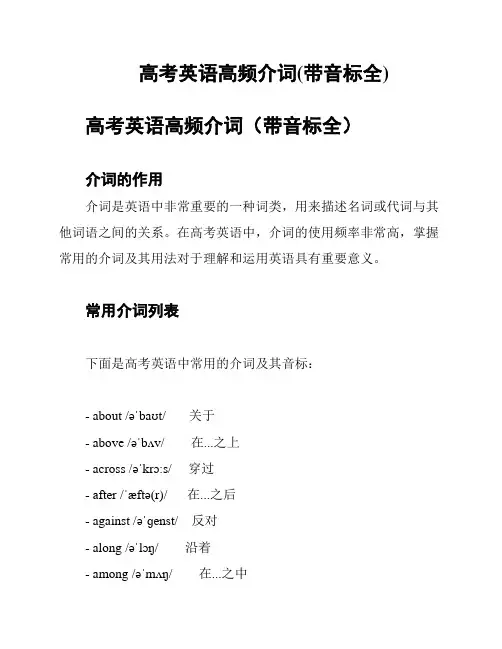
高考英语高频介词(带音标全)高考英语高频介词(带音标全)介词的作用介词是英语中非常重要的一种词类,用来描述名词或代词与其他词语之间的关系。
在高考英语中,介词的使用频率非常高,掌握常用的介词及其用法对于理解和运用英语具有重要意义。
常用介词列表下面是高考英语中常用的介词及其音标:- about /əˈbaʊt/ 关于- above /əˈbʌv/ 在...之上- across /əˈkrɔ:s/ 穿过- after /ˈæftə(r)/ 在...之后- against /əˈɡenst/ 反对- along /əˈlɔŋ/ 沿着- among /əˈmʌŋ/ 在...之中- around /əˈraʊnd/ 在...周围- as /əz/ 作为- at /æt/ 在...地方- before /bɪˈfɔ:/- behind /bɪˈhaɪnd/- below /bɪˈloʊ/- beside /bɪˈsaɪd/- between /bɪˈtwi:n/- beyond /bɪˈjɑ:nd/- but /bət/- by /baɪ/- concerning /kənˈsɜ:r.nɪŋ/- considering /kənˈsɪd.ə.rɪŋ/ - despite /dɪˈspaɪt/- down /daʊn/- during /ˈdʊr.ɪŋ/- for /fɔ:r/- from /frʌm/- in /ɪn/- inside /ɪnˈsaɪd/- into /ˈɪn.tu/- like /laɪk/- of /əv/- off /ɔ:f/- on /ɑ:n/- onto /ˈɑ:n.tu/- out /aʊt/- outside /aʊtˈsaɪd/- over /ˈoʊ.vɚ/- past /pæst/- regarding /rɪˈɡɑ:r.dɪŋ/- round /raʊnd/- since /sɪns/- through /θru:/- throughout /θ- to /tu:/- toward(s) /təˈwɔ:rd.z/ /təˈwɔ:rd/ - under /ˈʌn.dɚ/- underneath /ˌʌn.dɚˈniːθ/- until /ənˈtɪl/- up /ʌp/- upon /əˈpɑ:n/- with /wɪθ/- within /wɪˈθɪn/- without /wɪˈðaʊt/小结以上是高考英语中常用的介词及其音标。
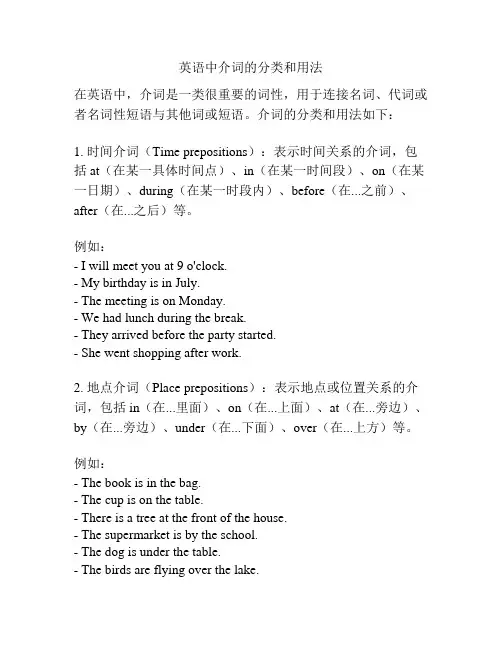
英语中介词的分类和用法在英语中,介词是一类很重要的词性,用于连接名词、代词或者名词性短语与其他词或短语。
介词的分类和用法如下:1. 时间介词(Time prepositions):表示时间关系的介词,包括at(在某一具体时间点)、in(在某一时间段)、on(在某一日期)、during(在某一时段内)、before(在...之前)、after(在...之后)等。
例如:- I will meet you at 9 o'clock.- My birthday is in July.- The meeting is on Monday.- We had lunch during the break.- They arrived before the party started.- She went shopping after work.2. 地点介词(Place prepositions):表示地点或位置关系的介词,包括in(在...里面)、on(在...上面)、at(在...旁边)、by(在...旁边)、under(在...下面)、over(在...上方)等。
例如:- The book is in the bag.- The cup is on the table.- There is a tree at the front of the house.- The supermarket is by the school.- The dog is under the table.- The birds are flying over the lake.3. 方式介词(Manner prepositions):表示行为方式的介词,如with(用...)、by(靠...方式)、like(像...一样)等。
例如:- He eats soup with a spoon.- She goes to work by bus.- The boy runs like a cheetah.4. 原因介词(Cause prepositions):表示原因关系的介词,如because of(因为...)、due to(由于...)、for(为了...)等。
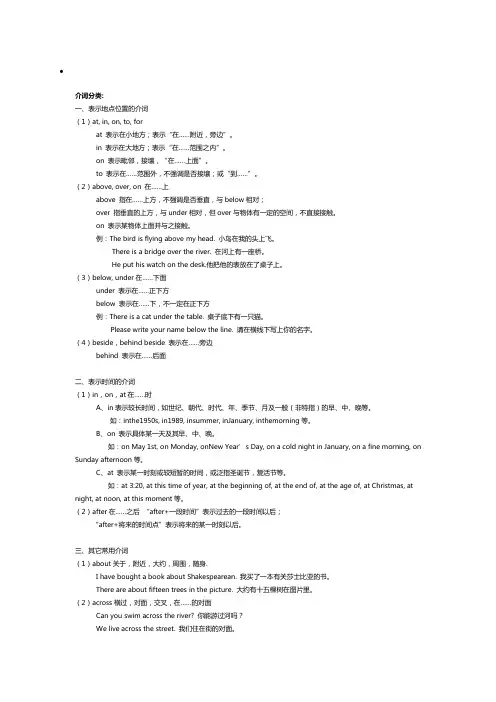
介词分类:一、表示地点位置的介词(1)at, in, on, to, forat 表示在小地方;表示“在……附近,旁边”。
in 表示在大地方;表示“在……范围之内”。
on 表示毗邻,接壤,“在……上面”。
to 表示在……范围外,不强调是否接壤;或“到……”。
(2)above, over, on 在……上above 指在……上方,不强调是否垂直,与below相对;over 指垂直的上方,与under相对,但over与物体有一定的空间,不直接接触。
on 表示某物体上面并与之接触。
例:The bird is flying above my head. 小鸟在我的头上飞。
There is a bridge over the river. 在河上有一座桥。
He put his watch on the desk.他把他的表放在了桌子上。
(3)below, under在……下面under 表示在……正下方below 表示在……下,不一定在正下方例:There is a cat under the table. 桌子底下有一只猫。
Please write your name below the line. 请在横线下写上你的名字。
(4)beside,behind beside 表示在……旁边behind 表示在……后面二、表示时间的介词(1)in,on,at在……时A、in表示较长时间,如世纪、朝代、时代、年、季节、月及一般(非特指)的早、中、晚等。
如:inthe1950s, in1989, insummer, inJanuary, inthemorning等。
B、on 表示具体某一天及其早、中、晚。
如:on May 1st, on Monday, onNew Year’s Day, on a cold night in January, on a fine morning, on Sunday afternoon等。
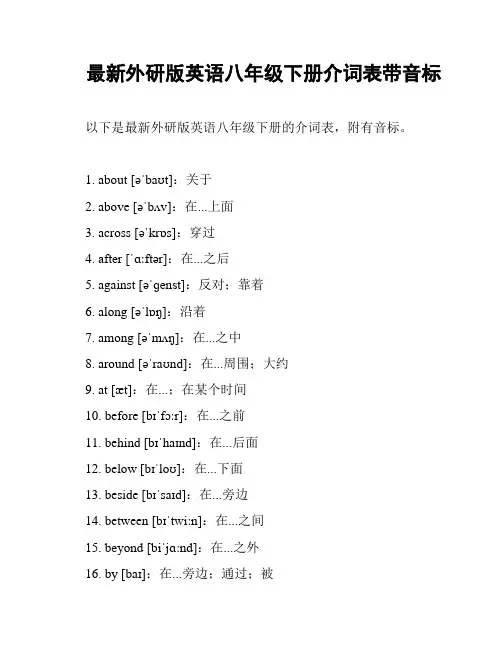
最新外研版英语八年级下册介词表带音标以下是最新外研版英语八年级下册的介词表,附有音标。
1. about [əˈbaʊt]:关于2. above [əˈbʌv]:在...上面3. across [əˈkrɒs]:穿过4. after [ˈɑːftər]:在...之后5. against [əˈɡenst]:反对;靠着6. along [əˈlɒŋ]:沿着7. among [əˈmʌŋ]:在...之中8. around [əˈraʊnd]:在...周围;大约9. at [æt]:在...;在某个时间10. before [bɪˈfɔːr]:在...之前11. behind [bɪˈhaɪnd]:在...后面12. below [bɪˈloʊ]:在...下面13. beside [bɪˈsaɪd]:在...旁边14. between [bɪˈtwiːn]:在...之间15. beyond [biˈjɑːnd]:在...之外16. by [baɪ]:在...旁边;通过;被17. down [daʊn]:沿着;从...往下18. during [ˈdjʊrɪŋ]:在...期间19. except [ɪkˈsept]:除了20. for [fɔːr]:为了;因为21. from [frɒm]:从...来22. in [ɪn]:在...里面;在...方面23. inside [ɪnˈsaɪd]:在...里面24. into [ˈɪntuː]:进入25. like [laɪk]:像;喜欢26. near [nɪr]:在...附近27. of [ʌv]:属于;关于28. off [ɒf]:离开;关闭29. on [ɒn]:在...上面30. out [aʊt]:出去31. outside [ˌaʊtˈsaɪd]:在...外面32. over [ˈoʊvər]:在...上方;超过33. through [θruː]:穿过34. to [tuː]:到;向35. toward(s) [təˈwɔːrdz]:朝着36. under [ˈʌndər]:在...下面37. up [ʌp]:向上38. with [wɪð]:和...一起39. within [wɪˈðɪn]:在...之内以上是最新外研版英语八年级下册的介词表带音标。
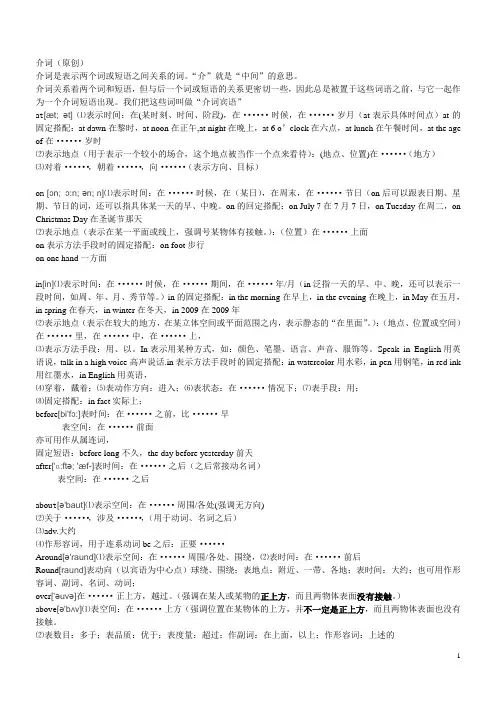
介词(原创)介词是表示两个词或短语之间关系的词。
“介”就是“中间”的意思。
介词关系着两个词和短语,但与后一个词或短语的关系更密切一些,因此总是被置于这些词语之前,与它一起作为一个介词短语出现。
我们把这些词叫做“介词宾语”a t[æt; ət]⑴表示时间:在(某时刻、时间、阶段),在······时候,在······岁月(at表示具体时间点)at的固定搭配:at dawn在黎时,at noon在正午,at night在晚上,at 6 o’clock在六点,at lunch在午餐时间,at the age of在······岁时⑵表示地点(用于表示一个较小的场合,这个地点被当作一个点来看待):(地点、位置)在······(地方)⑶对着······,朝着······,向······(表示方向、目标)o n [ɔn; ɔ:n; ən; n]⑴表示时间:在······时候,在(某日),在周末,在······节日(on后可以跟表日期、星期、节日的词,还可以指具体某一天的早、中晚。
on的回定搭配:on July 7在7月7日,on Tuesday在周二,on Christmas Day在圣诞节那天⑵表示地点(表示在某一平面或线上,强调号某物体有接触。
):(位置)在······上面on表示方法手段时的固定搭配:on foot步行on one hand一方面i n[in]⑴表示时间:在······时候,在······期间,在······年/月(in泛指一天的早、中、晚,还可以表示一段时间,如周、年、月、秀节等。
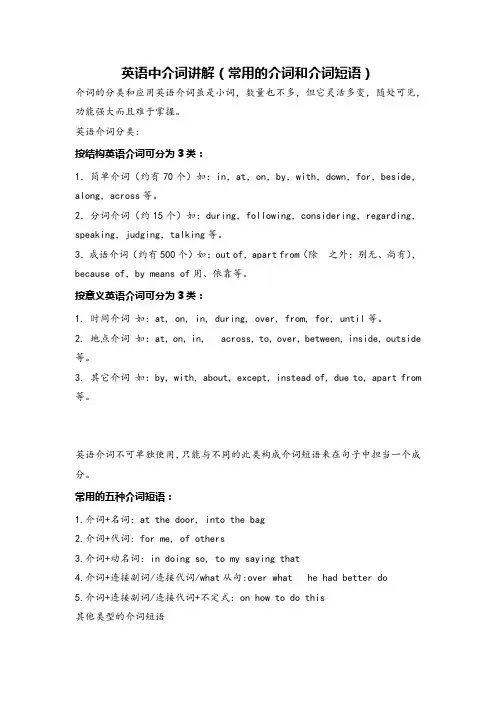
英语中介词讲解(常用的介词和介词短语)介词的分类和应用英语介词虽是小词,数量也不多,但它灵活多变,随处可见,功能强大而且难于掌握。
英语介词分类:按结构英语介词可分为3类:1.简单介词(约有70个)如:in,at,on,by,with,down,for,beside,along,across等。
2.分词介词(约15个)如:during,following,considering,regarding,speaking,judging,talking等。
3.成语介词(约有500个)如:out of,apart from(除之外:别无、尚有),because of,by means of用、依靠等。
按意义英语介词可分为3类:1. 时间介词如:at, on, in, during, over, from, for, until等。
2. 地点介词如:at, on, in, across, to, over, between, inside, outside 等。
3. 其它介词如:by, with, about, except, instead of, due to, apart from 等。
英语介词不可单独使用,只能与不同的此类构成介词短语来在句子中担当一个成分。
常用的五种介词短语:1.介词+名词:at the door, into the bag2.介词+代词: for me, of others3.介词+动名词: in doing so, to my saying that4.介词+连接副词/连接代词/what从句:over what he had better do5.介词+连接副词/连接代词+不定式:on how to do this其他类型的介词短语6.介词+介词短语:from across the street, until after dinner7.介词+副词:from below8.介词+复合结构:with the light on9.介词+不定式(but/except):…did nothing but sleep介词 -- 连接词与词纽带。
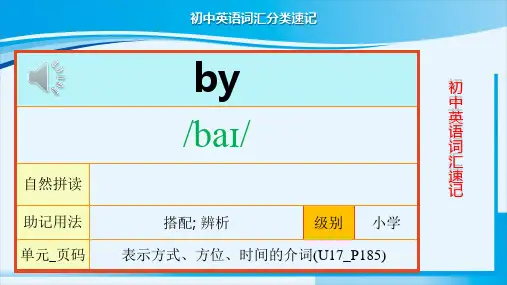
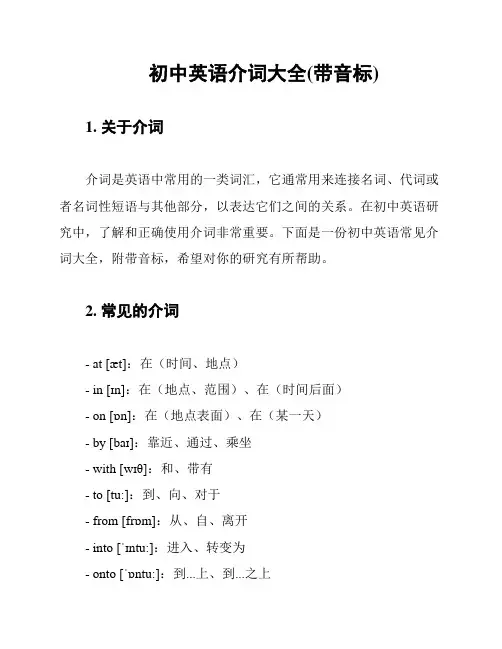
初中英语介词大全(带音标)1. 关于介词介词是英语中常用的一类词汇,它通常用来连接名词、代词或者名词性短语与其他部分,以表达它们之间的关系。
在初中英语研究中,了解和正确使用介词非常重要。
下面是一份初中英语常见介词大全,附带音标,希望对你的研究有所帮助。
2. 常见的介词- at [æt]:在(时间、地点)- in [ɪn]:在(地点、范围)、在(时间后面)- on [ɒn]:在(地点表面)、在(某一天)- by [baɪ]:靠近、通过、乘坐- with [wɪθ]:和、带有- to [tu:]:到、向、对于- from [frɒm]:从、自、离开- into [ˈɪntu:]:进入、转变为- onto [ˈɒntu:]:到...上、到...之上- out of [aʊt ʌv]:从...出来- for [fɔːr]:为、对于- about [əˈbaʊt]:关于、大约- with [wɪð]:用、带、跟- without [wɪˈðaʊt]:没有、无- of [ʌv]:的、属于- by [baɪ]:通过、靠- between [bɪˈtwiːn]:在...之间- among [əˈmʌŋ]:在...之中- near [nɪər]:靠近- beside [bɪˈsaɪd]:在旁边- under [ˈʌndər]:在...下面- over [ˈəʊvər]:在...上方- above [əˈbʌv]:在...之上- below [bɪˈləʊ]:在...之下- through [θruː]:穿过、通过3. 注意事项- 介词与其后的名词、代词有固定搭配,需要进行记忆。
- 不同介词有不同的使用场景和意义,需要根据具体语境进行选择。
以上是初中英语介词大全,带有音标,并附有简要说明。
在研究中,要多加练和熟练掌握这些介词的正确用法,以提升语言运用能力。
希望这份文档对你的研究有所帮助!参考资料:。
介词英语单词大全100个一、简单介词。
1. about [əˈbaʊt] prep. 关于;大约。
2. above [əˈbʌv] prep. 在……上面;超过。
3. across [əˈkrɒs] prep. 穿过;横穿。
4. after [ˈɑːftə(r)] prep. 在……之后。
5. against [əˈɡenst] prep. 反对;靠着。
6. along [əˈlɒŋ] prep. 沿着。
7. among [əˈmʌŋ] prep. 在……中间(三者或三者以上)8. around [əˈraʊnd] prep. 在……周围;大约。
9. as [əz] prep. 作为;当作。
10. at [æt] prep. 在(表示存在或出现的地点、场所、位置、空间等);以(某种价格、速度等)11. before [bɪˈfɔː(r)] prep. 在……之前。
12. behind [bɪˈhaɪnd] prep. 在……后面。
13. below [bɪˈləʊ] prep. 在……下面;低于。
14. beneath [bɪˈniːθ] prep. 在……之下(正下方)15. beside [bɪˈsaɪd] prep. 在……旁边。
16. between [bɪˈtwiːn] prep. 在……之间(两者之间)17. beyond [bɪˈjɒnd] prep. 超过;越过;那一边。
18. but [bət] prep. 除……以外。
19. by [baɪ] prep. 被;由;通过;在……旁边;在……之前。
二、复合介词。
20. according to [əˈkɔːdɪŋ tuː] prep. 根据;按照。
21. ahead of [əˈhed ɒv] prep. 在……之前;胜过。
22. apart from [əˈpɑːt frəm] prep. 除……之外;且不说。
23. as for [æz fɔː(r)] prep. 至于;关于。
介词(英语介词)—搜狗百科
介词又叫做前置词,表示它后面的名词或代词(或相当于名词的其他词类;短语或从句)与其他句子成分的关系。
介词通常位于名词或代词之前。
(1)简单介词
包括in,on,with,by,for,at等。
(2)合成介词
包括into,within,throughout,inside,outside等
(3)重叠介词
包括fromamong从...当中,from behind从...后面,untilafter 直至...之后,atabout在大约...,after about在大约...之后等(4)介词短语
一个或两个简单介词和一个或几个其他词类构成一个短语,作用相当于一个介词,这就叫做介词短语。
这类介词的末尾总是一个简单介词,如according to,because of,by means of,in addition to,in front of, in spite of,into等。
新版人教版七年级上册英语介词表(含音标)本介词表列举了新版人教版七年级上册英语中常用的介词及其发音,供同学们参考。
介词列表- aboard [əˈbɔːrd]:在船(飞机、车)上- about [əˈbaʊt]:关于- above [əˈbʌv]:在……之上- across [əˈkrɒs]:横越、穿过- after [ˈɑːftər]:在……之后- against [əˈɡenst]:反对、靠着- along [əˈlɒŋ]:沿着- among [əˈmʌŋ]:在……之中- around [əˈraʊnd]:在周围、环绕- as [æz]:作为、像、当……的时候- at [æt]:在……的地方、在具体时间- before [bɪˈfɔːr]:在……之前- behind [bɪˈhaɪnd]:在……之后- below [bɪˈləʊ]:在……之下- beneath [bɪˈniːθ]:在……下面- beside [bɪˈsaɪd]:在……旁边- between [bɪˈtwiːn]:在……之间- beyond [bɪˈjɒnd]:在……的那边、超出……的范围- but [bʌt]:除了、但是- by [baɪ]:在附近、跟、被(动作)- concerning [kənˈsɜːnɪŋ]:关于- down [daʊn]:向下- during [ˈdjʊərɪŋ]:在……期间- except [ɪkˈsept]:除……之外- for [fɔːr]:为了、在……期间、因为- from [frɒm]:从……开始- in [ɪn]:在……里面、在具体时间- inside [ˈɪnsaɪd]:在……里面- into [ˈɪntuː]:进、入、到……里面- like [laɪk]:像、喜欢- near [nɪər]:在……附近- of [əv]:属于、……的、关于- off [ɒf]:从……离开- on [ɒn]:在……上面、在具体时间- out [aʊt]:从……出来- outside [ˈaʊtsaɪd]:在……外面- over [ˈəʊvər]:在……上方、超过- past [pɑːst]:经过、在……过去的时候- round [raʊnd]:在周围、环绕- since [sɪns]:从……之后- through [θruː]:穿过、经过- to [tuː]:到、朝向- toward(s) [təˈwɔːdz]:朝着、向……方向- under [ˈʌndər]:在……下面- until [ʌnˈtɪl]:直到……的时候- up [ʌp]:向上- upon [əˈpɒn]:在……上面- with [wɪð]:和、带着- within [wɪˈðɪn]:在……之内注:小括号内为音标。
介词的种类英语中最常用的介词,按照不同的分类标准可分为以下几类:(1). 简单介词、复合介词和短语介词①.简单介词是指单一介词。
如:at , in ,of ,by , about , for, from , except , since, near, with 等。
②. 复合介词是指由两个简单介词组成的介词。
如:Inside, outside , onto, into , throughout, without , as to as for , unpon, except for 等。
③. 短语介词是指由短语构成的介词。
如:In front of , by means o f, on behalf of, in spite of , by way of , in favor of , in regard to 等。
(2). 按词义分类{1} 表地点(包括动向)的介词。
如:About ,above, across, after, along , among, around , at, before, behind, below, beneath, beside, between , beyond ,by, down, from, in, into , near, off, on, over, through, throught, to, towards,, under, up, unpon, with, within , without 等。
{2} 表时间的介词。
如:About, after, around , as , at, before , behind , between , by, during, for, from, in, into, of, on, over, past, since, through, throughout, till(until) , to, towards , within 等。
一分钟搞定英语所有介词表示方位的介词:in,to, on1. in 表示在某地范围之内∙Shanghai is/lies in the east of China.上海在中国的东部。
2. to 表示在某地范围之外∙Japan is/lies to the east of China.日本位于中国的东面。
3. on 表示与某地相邻或接壤∙Mongolia is/lies on the north of China.蒙古国位于中国北边。
表示计量的介词:at, for, by1.at表示“以……速度”“以……价格”∙I sold my car at a high price.我以高价出售了我的汽车。
2. for 表示“用……交换,以……为代价”。
∙He sold his car for 500 dollars.他以五百元把车卖了。
注意:at表示单价(price) ,for表示总钱数。
3. by表示“以……计”,后跟度量单位。
∙They paid him by the month.他们按月给他计酬。
表示材料的介词:of, from, in1. of 成品仍可看出原料∙This box is made of paper.这个盒子是纸做的。
2. from成品已看不出原料∙Wine is made from grapes.葡萄酒是葡萄酿成的。
3.in表示用某种材料或语言∙They talk in English.他们用英语交谈。
注意:in指用材料,不用冠词;而with指用工具,要用冠词。
表示工具或手段的介词:by, with, on1. by用某种方式,多用于交通∙by bus 乘公共汽车by e-mail. 通过电子邮件注意:表示搭乘交通工具时,用by时不用冠词,用in时要用冠词。
2. with表示“用某种工具”∙He broke the window with a stone.他用石头把玻璃砸坏了。
∙注意:with表示用某种工具时,必须用冠词或物主代词。
3分钟读懂介词
介词是连接词和名词、代词、动词等成分的一种虚词,它可以表示时间、地点、方式、原因等关系。
介词通常位于名词或代词之前,构成介词短语,对句子结构和意义产生重要影响。
常见的介词包括in、on、at、to、from、of、with、by等。
其中,in表示在某个区域、时间段、状态等内部,例如in the park、in the morning、in trouble;on表示在某个表面、日期、时间等上面,例如on the table、on Monday、on time;at表示在某个具体的点、时刻或场所,例如at the corner、at noon、at school;to表示向某个地方或对象,例如go to the cinema、give the book to me;from表示从某个地方、时间等起始,例如come from Beijing、from now on;of表示属于某个人、物或性质等,例如a cup of tea、the owner of the house;with表示伴随、附带某种情况或人,例如with a smile、talk with friends;by表示通过某种手段或方式进行,例如by train、by email。
介词的正确使用可以使语言表达更为准确和流畅,需要在实践中不断积累和熟练掌握。
- 1 -。
英语介词的分类详解读
介词的分类
介词又叫前置词,是一种虚词。
介词分为三种,一种是简单介词,如at,in,on,beside,to ,for 等;另一种是短语介词,即由两个以上的词组组成的短语,in front of,because of,out of,instead 如of 等;还有一种二重介词,如until after,from behind 等。
1.表示时间的介词
(1) in表示“在某一时间段”或“在某一时候”,如用在月、季、年份、时代、世纪等时间名词的前面,或用来泛指一天的某一段时间。
in也可以指“在……之后”,表示从说话起的若干时间内。
如:in July/summer/2000/ancient times
The bus will be here in ten minutes.
(2) on表示“在特定的某一天”,也可用于带有修饰语的一天的某个时间段之前。
如:on Saturday,on Saturday morning,on the morning of August 1st
(3) at表示“在某一时间点”,或用来表示不确定的时间和短期的假日、时节等。
如:at six o‘clock,at Easter
(4) over,through (out)两者均指“经过的全部时间”。
如:Stay over the Christmas.
(5) for与since:for表示动作或状态延续的全部时间长度,为“长达……”之意;since用于指从过去特定的某个时刻到说话时为止的一段时间;含有since时间短语的句子要用完成时,但含有for时间短语的句子不一定要用完成时。
如:I have been there for six years.
We have not seen each other since 1993.
(6) during指“在……时期/时间内”,必须接表示一段时间的词或词组作宾语。
如:She was ill for a week,and during that week she ate little.
2.表示地点的介词
(1) above,below,over,under,on,on top of,beneath,underneath:above和below分别表示“高于”和“低于”的意思,不一定指垂直方向上的上下;over 和under分别表示垂直方向上的上下或高低;on/on top of 和beneath/underneath表示“和表面相接触”意义上的上下。
以上三组介词互为反义词。
如:The temple stands on top of the hill.
The pen is beneath the book.
There is a lamp on the desk.
(2) at,on,in:at指小地点或集会场合;on表示线或面上的位置;in表示在立体、区域或环境内,特别是那些较大,能够容纳相应事物的环境。
如:He works at Peking University.
Your radio is on the desk.
He’s sitting in the sun.
(3) between与among:between用来说明“在……两者之间”或“三个以上人或事物中的每两者之间的相互关系”;among用来说明“在……三者以上之间”的相互关系;among可以用来表示没有确定数目的物体之间的相互关系。
如:There is a small river between the two villages.
The book is the best among these modern novels.
The relations between various countries are very important.
3.表示原因的介词
(1) for常常表示褒贬、奖惩的原因或心理原因。
如:They will reward you for your help.
(2) from和out of常常表示动机或原因;through表示消极或间接的原因。
如:He feels weak from lack of sleep.
He broke down through overwork.
4.表示目的的介词
for和to都可以引导目的地。
for表示拟定的接收人或目的,for跟在含有出发或开始意义的动词后,如:leave,set out,
start,depart,sail等;to表示实际的接收人或目的,to 跟在含有方向性的动词后。
如:go,come,run,walk,move,fly,drive,ride 等。
如:We have left for Hong Kong.
He flew to America via Hong Kong.
5.表示“关于……”的介词
一般about用于比较随便的谈话或非正式的文体;on用于正式的讲话、著作或报告中;of用于动词talk,read,know,hear等的后面。
如:What are you talking about?in terms of natural resources
6.表示原料的介词
of和out of表示制成品的材料仍保持原材料的性质;from 表示制成品已失去了原材料的性质。
如:His house was built of brick.
He made these toys out of old cigar-boxes.
Steel is made from iron.
7.表示价格的介词
at和for都可表示价格,at仅表示价格;for还表示“交换”。
如:Eggs are sold at 95 cents a dozen here.
I bought it for five pounds.。